
Related
Topics
France has entered a third day of mourning after a string of suicide bombings and shootings targeted restaurants, a concert hall and the national soccer stadium on Friday night. The simultaneous attacks killed 129 people and injured hundreds more. It was the deadliest attack on French soil in decades. The worst carnage was unleashed as three gunmen killed at least 89 people at a rock concert at the Bataclan theater before detonating explosive belts. Thousands of Parisians have been gathering to mourn at the Place de la République despite a ban on demonstrations and public gatherings until November 19. Democracy Now! producer Sam Alcoff spoke to people in the square on Saturday.
Transcript
AMY GOODMAN: France has entered a third day of mourning after a string of suicide bombings and shootings targeted restaurants, a concert hall and the national soccer stadium Friday night. The simultaneous attacks killed 129 people and injured hundreds more. It was the deadliest attack on French soil since World War II. The worst carnage was unleashed as three gunmen killed at least 89 people at a rock concert at the Bataclan theater before detonating explosive belts.
In retaliation, France launched its heaviest airstrikes yet against the Syrian city of Raqqa, which has long served as the de facto capital of the so-called Islamic State. Friday’s attacks in Paris came just a day after the Islamic State claimed credit for a double attack in southern Beirut that killed at least 43 people, and two weeks after the group claimed responsibility for bringing down a Russian airliner over the Sinai Peninsula killing all 224 people on board. Over the weekend, French President François Hollande described Friday’s attack as an act of war.
PRESIDENT FRANÇOIS HOLLANDE: [translated] Fellow citizens, what happened yesterday in Paris and Saint-Denis near the Stade de France was an act of war. Faced with war, the country has to take appropriate steps. It’s an act of war committed by a terrorist army, Daesh, an Islamist army, against France, against the values we uphold throughout the world, against who we are, a free country, which speaks to the whole planet.
AMY GOODMAN: Speaking in Turkey at the G20 summit, President Obama described the events in Paris as “an attack on the civilized world.”
PRESIDENT BARACK OBAMA: As was true with the terrible attacks that took place in Ankara, the killing of innocent people, based on a twisted ideology, is an attack not just on France, not just on Turkey, but it’s an attack on the civilized world.
AMY GOODMAN: Authorities said they believe the Paris attacks were carried out by eight assailants working in three teams. Seven of the men died in the attacks. A massive manhunt is underway for the eighth—Salah Abdeslam, a Belgian-born French national. Two of his brothers were said to have died in the attack. Several of the attackers were French nationals. Authorities also said one of the suicide bombers who blew himself up outside the national stadium was carrying a Syrian passport, and his fingerprints matched someone who passed through Greece in October.
Overnight, French authorities carried out 168 raids, making 23 arrests, as part of the investigation. Police in the Belgian city of Molenbeek also carried out a series of raids this morning.
Friday’s attack came just 10 months after two brothers, Saïd and Chérif Kouachi, attacked the French satirical weekly newspaper Charlie Hebdo in Paris. Armed with assault rifles and other weapons, they killed 11 people and injured 11 others in the building.
Thousands of Parisians have been gathering to mourn in the Place de la République, despite a ban on demonstrations and public gatherings until November 19th. Democracy Now! producer Sam Alcoff spoke to people in the square on Saturday.
ALVIN: [translated] My name is alvin. We are in Paris, Place de la République. In fact, we are here to be united against what is happening—simply a massacre. What happened is unspeakable. It’s what happened in Syria, in the Middle East, Near East, Israel. It happened under our own balcony. We didn’t see it coming. We are here in homage. Simply that. We are Parisians.
MATHILDE: My name is Mathilde. I heard it by the radio. [translated] We came together to leave flowers, bouquets, messages, to honor the victims and their families, to support them.
LAURENCE: I was on the restaurant, like people who were killed. I was taking drink with friends on the street, because it was a weather fine. And I can’t believe it. I think it was just someone—a mad people. But after, when I knew that there are many attacks, I think about terrorists.
FAISAL: [translated] I was well into the match with my dad. We were watching the France-Germany football match. They told us on TV. The news announced the first shots in the café. It was just that, in the beginning.
LUC: Many people are shocked. France is already exhausted by January, by the January event, Charlie Hebdo. I think it’s all a bit too much.
LUIS: [translated] I think they are children of the republic. They were badly educated at some moment in their lives, and they went off the right track. And after, in France, they had enough. Ras le bol, as they say in French, Ras le cul. Understand? This is why they took up arms.
LAURENCE: Tonight I was near the quarter where attacks had been made. And it could be anyone. I am here because so much people die by barbarian, barbarian attack. And I want to think to these people, and I want to think with other Parisians, not alone on my flat. And I want to say I’m not afraid, at all.
FAISAL: [translated] It’s very difficult. I am of Algerian origin. I lived through the '90s in Algeria. And I will tell you, it's very complicated.
POLICE: [translated] Please go back to your homes, leave the plaza, calmly, please.
BENE: [translated] And they will be scared. They will not want to leave their homes. They will ask themselves questions that one should not ask oneself.
FAISAL: [translated] I do not lose hope in the French people. We proved January 15, 2015, that we could be united. We will again show that we are very strong here in France.
BENE: [translated] When you walk the streets outside in Paris, this is where you really see what people think, in the face of these events. They are not split, they are together, because they know the real truth. I want to say, there is no problem.
LUC: Unity, no. It’s for one day or two days, no longer. I think it’s—unity is a good word, but the French will never be united. Never. It’s a gold mine for Le Pen. It’s a gold mine, because I think, as far as I know, one of the terrorists was a Syrian, so he came—he wasn’t French. So, for Le Pen, it’s a good thing. She can work, you know, on this close the borders and stuff. So, I think, yeah, Le Pen will be more powerful after this.
FAISAL: [translated] I am not sure that this will give more voice to Le Pen than before. For me, Le Pen does not have all the solutions to the real problems of France. Also, they can have influence in little towns, villages, on old people, not the new generation that grew up together.
LAURENCE: Daesh is just a little, little movement. I think U.S.A., Great Britain, France and all these great countries can cut [it off]. Refugees are not responsible for Daesh and other terrorist attacks.
BENE: [translated] Me, personally, it doesn’t bother me. They [refugees] can all come, as many as they want. The door is open. There’s room. There’s lots of room. They should come.
FAISAL: [translated] Yes, Europe will surely retreat concerning refugees. They will be the first victims of these attacks. The refugees will pay first. Second will be Muslims. Third will be, of course, everyone of Muslim, or perhaps Muslim, descent; Maghrébins, Middle Easterners, will be the target of the politicians, of the public regard, unfortunately. But the refugees will be the first victims, that is sure.
AMY GOODMAN: Voices of Parisians gathering to mourn at the Place de la République on Saturday night. Special thanks to Democracy Now!’s Sam Alcoff and Anna Gold, both in Paris. When we come back, we go directly to Paris. Stay with us.

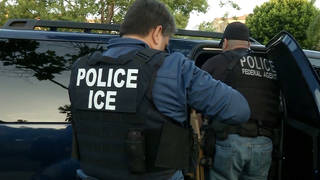
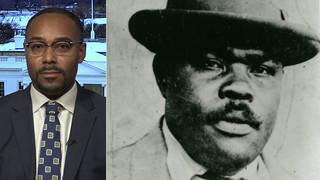
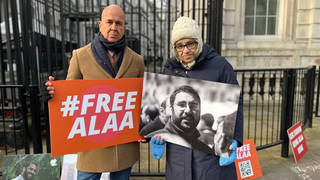
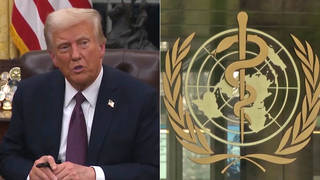






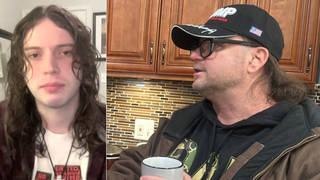
Media Options